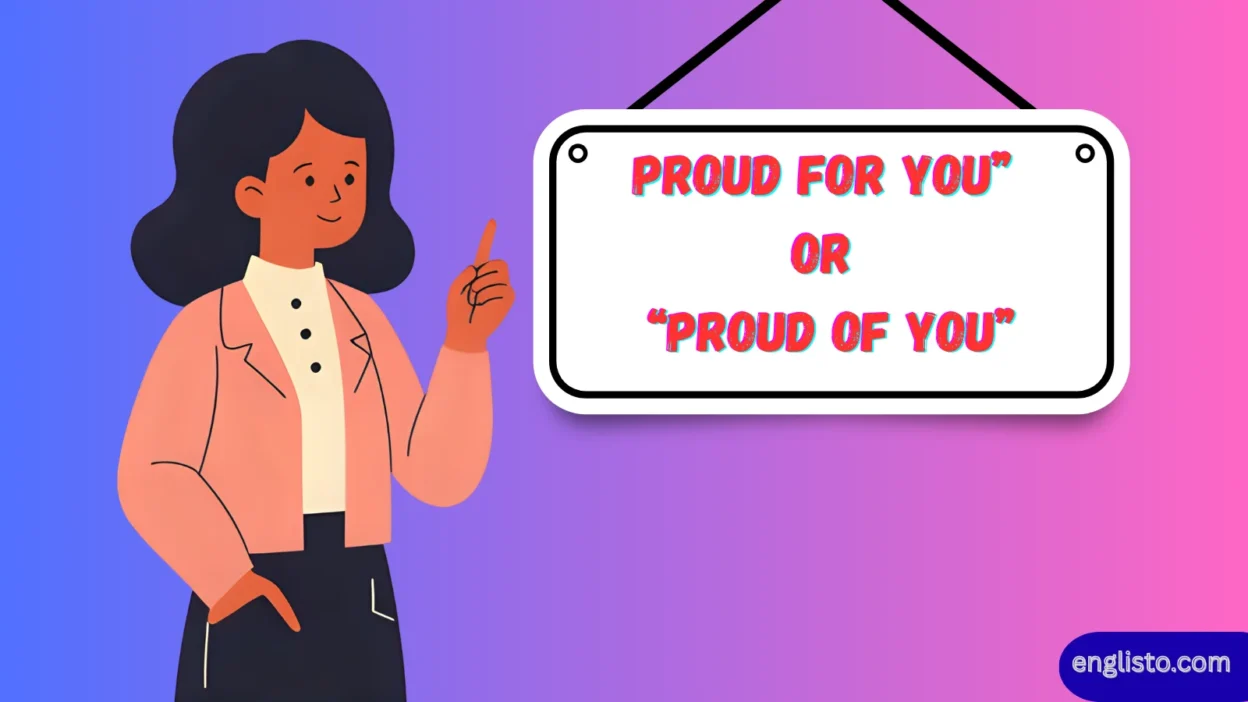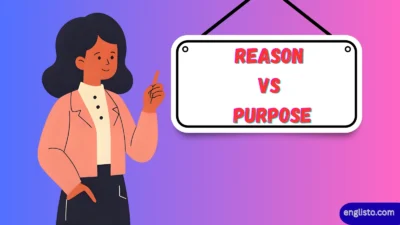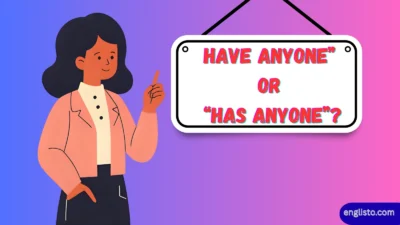The phrases “proud for you” and “proud of you” sound similar, but in English, their meanings and emotional tones are very different.
The key difference lies in who feels the pride and why.
| Phrase | Meaning | When to Use | Example |
| Proud of You | You feel pride because of someone’s achievement or behavior. | When someone you care about achieves something. | “I’m proud of you for graduating!” |
| Proud for You | You’re happy on someone’s behalf because they have something to be proud of. | When you share someone’s joy or success, but the pride belongs to them. | “I’m proud for you—you’ve worked so hard for this.” |
Simply put:
👉 “Proud of you” = You’re the reason I feel proud.
👉 **“Proud for you” = I’m happy because you’re proud of yourself.”
What “Proud of You” Really Means in Everyday English
“Proud of you” is one of the most heartwarming phrases in English.
It means admiration, love, and recognition of someone’s effort, success, or character.
You’ll hear it everywhere — from parents to children, teachers to students, or partners expressing affection.
Examples:
- “I’m so proud of you for getting that promotion.”
- “We’re proud of you, son. You made it through tough times.”
- “She’s proud of you for standing up for yourself.”
This phrase is emotionally intimate and encouraging — it celebrates someone’s growth.
When “Proud for You” Can Be Grammatically Acceptable
While “proud of you” is the standard, “proud for you” can be correct in specific emotional contexts.
It’s used when:
- You’re expressing happiness for another person’s success.
- You’re not the direct source of pride, but you empathize with their joy.
Correct examples:
- “I’m proud for you and your team—it’s a huge accomplishment!”
- “You must be thrilled. I’m proud for you!”
However, never say “proud for you” when you mean you’re directly admiring someone’s behavior.
That’s when “proud of you” fits best.
Common Grammar Rules Behind “Proud + Preposition”
| Preposition | Meaning | Correct Usage Example |
| of | Pride directed at someone or something | “I’m proud of you for finishing college.” |
| for | Pride on behalf of someone else’s success | “I’m proud for you—it’s your big day!” |
| about | Pride regarding a situation or fact | “She’s proud about her new project.” |
| to be | Followed by infinitive to express a reason | “I’m proud to be your friend.” |
👉 Rule of Thumb: Use “of” for people, “for” for shared joy, and “to be” for describing yourself.
Native Speaker Preferences: Which Phrase Sounds Natural?
In everyday English, native speakers almost always say “proud of you.”
“Proud for you” sounds rare or emotionally specific.
| Phrase | Frequency in Native Speech | Emotional Tone |
| Proud of you | ⭐⭐⭐⭐⭐ (very common) | Natural, affectionate |
| Proud for you | ⭐⭐ (less common) | Empathetic, supportive |
If you’re ever unsure, use “proud of you.” It’s universally accepted and sounds natural in any context.
Emotional Nuance: “Proud of You” vs. “Proud for You”
Let’s break down the emotional nuance of both phrases:
| Emotion | “Proud of You” | “Proud for You” |
| Admiration | ✅ Strong | ⚪ Mild |
| Shared joy | ⚪ Mild | ✅ Strong |
| Direct relationship | ✅ Often close | ⚪ Often neutral |
| Common use in speech | ✅ Very common | ⚪ Rare |
Example:
“I’m proud of you for winning the award.” (You’re praising them directly.)
“I’m proud for you—you must feel amazing.” (You’re celebrating with them.)
Real-Life Conversation Examples for Both Phrases
Conversation 1:
A: “I finally finished my thesis!”
B: “Wow, I’m so proud of you!” ✅
Conversation 2:
A: “My daughter just became a doctor.”
B: “That’s wonderful! I’m proud for you.” ✅
Both are correct — but they express different perspectives.
How Context Changes the Meaning of “Proud”
Context is everything in English.
The word “proud” can shift meaning depending on what follows it.
| Context | Correct Phrase | Example |
| Someone’s achievement | Proud of you | “I’m proud of you for winning.” |
| Someone’s joy or event | Proud for you | “I’m proud for you—it’s your moment.” |
| Describing identity | Proud to be | “I’m proud to be your friend.” |
Always match the preposition to the emotional or grammatical context.
The Psychology of Pride: Why the Preposition Matters
Linguistically, “proud of you” expresses ownership of admiration, while “proud for you” expresses empathy for another’s pride.
In psychology:
- “Proud of you” reflects parental or mentor pride.
- “Proud for you” reflects peer happiness or supportive empathy.
So, while both convey positivity, they differ in emotional ownership.
“Proud of You” in Family, Friendship, and Love Contexts
This phrase shows up in all kinds of relationships.
| Relationship | Example | Tone |
| Parent & child | “I’m proud of you, sweetheart.” | Nurturing |
| Friend | “I’m proud of you for staying strong.” | Supportive |
| Partner | “I’m proud of you every single day.” | Romantic |
| Mentor | “I’m proud of you for growing into this role.” | Professional |
It’s not just a sentence — it’s emotional validation.
“Proud for You” in Moments of Shared Happiness
Use “proud for you” when you’re celebrating someone else’s feelings of pride.
Examples:
- “You must feel amazing. I’m proud for you!”
- “It’s your win, and I’m proud for you.”
- “They’re finally recognizing your talent—I’m proud for you!”
It’s a cheerleader’s phrase — one that shares joy rather than admiration.
Comparing British and American English Usage
Interestingly, both dialects agree on the standard:
“Proud of you” is dominant in both American and British English.
| Variety | Common Phrase | Example |
| American English | Proud of you | “I’m proud of you, buddy.” |
| British English | Proud of you | “We’re very proud of you, mate.” |
| Both (rare) | Proud for you | “I’m proud for you and your success.” |
So, no regional confusion here — “of” wins universally.
Common Mistakes and How to Avoid Them
| Mistake | Why It’s Wrong | Correct Form |
| “I’m proud for you winning.” | Wrong preposition for direct admiration | “I’m proud of you for winning.” |
| “She’s proud for her son.” | Confuses emotion ownership | “She’s proud of her son.” |
| “I’m proud for my job.” | Job isn’t a person or self-aware | “I’m proud of my job.” |
💡 Tip: If you admire a person, use of.
If you’re happy for their joy, use for.
Quick Grammar Table: “Proud” + Preposition Combinations
| Structure | Meaning | Example |
| Proud of + noun/pronoun | Expressing admiration | “Proud of you” |
| Proud for + noun/pronoun | Sharing happiness | “Proud for you” |
| Proud to + verb | Expressing personal pride | “Proud to help” |
| Proud about + noun | Referring to a situation | “Proud about our work” |
Synonyms and Alternative Phrases for “Proud of You”
| Synonym / Phrase | Emotional Tone | Example |
| I admire you | Respectful | “I truly admire you.” |
| You inspire me | Uplifting | “You inspire me every day.” |
| I’m so impressed | Casual praise | “I’m so impressed with your progress.” |
| Hats off to you | Idiomatic | “Hats off to you for finishing early!” |
| Kudos to you | Informal | “Kudos to you for the win!” |
Use these when you want to sound natural but avoid repetition.
How to Express Pride Without Using “Proud”
Sometimes, the best compliment isn’t about pride at all.
Alternatives:
- “You did an amazing job.”
- “I couldn’t be happier for you.”
- “That’s such an incredible achievement!”
- “You’ve made everyone so happy.”
These phrases sound warmer and less formal, great for friends or coworkers.
The Emotional Impact of Saying “I’m Proud of You”
Psychologists say hearing “I’m proud of you” triggers feelings of validation, self-worth, and belonging.
It’s one of the most powerful affirmations in English because it:
- Acknowledges effort, not just results
- Strengthens emotional bonds
- Builds motivation and confidence
“I’m proud of you” is more than grammar — it’s emotional grammar.
Real Messages and Quotes Using “Proud of You” Correctly
| Type | Quote | Tone |
| Motivational | “I’m proud of you for not giving up.” | Encouraging |
| Romantic | “I’m proud of you for being yourself.” | Loving |
| Parental | “I’m proud of you, my child.” | Tender |
| Friendly | “You’ve come so far. Proud of you!” | Supportive |
Idioms and Expressions Related to Pride
| Idiom | Meaning | Example |
| Bursting with pride | Extremely proud | “She was bursting with pride watching her son perform.” |
| Swell with pride | Feel proud physically | “He swelled with pride at the award.” |
| Pride and joy | Something cherished | “His daughter is his pride and joy.” |
Idioms add emotional color — and sound beautifully natural in speech.
Using “Proud” in Formal and Informal Writing
| Style | Example | Tone |
| Formal | “We are proud of our company’s achievements.” | Professional |
| Informal | “I’m proud of you, bro!” | Casual |
| Academic | “The nation is proud of its heritage.” | Neutral |
Always adjust tone depending on audience and setting.
Social Media Examples: What People Actually Say
People often shorten or modify phrases online.
Here are common real-world examples:
- “So proud of you, bestie 💖”
- “Proud for you and everything you’ve done!”
- “Can’t stop smiling — proud of my team!”
- “I’m proud for you — you deserve it!”
Even online, “proud of you” dominates — but “proud for you” adds emotional flavor.
Grammar Quiz: Test Your Understanding
| Question | Correct Answer |
| “I’m ___ you for passing.” | Proud of |
| “I’m ___ you—it’s your big day.” | Proud for |
| “She’s ___ to call you her son.” | Proud to be |
| “He’s ___ his achievements.” | Proud of |
Expert Linguistic Insights on “Proud of You”
According to linguistic studies on collocational frequency, “proud of” occurs nearly 100 times more often than “proud for.”
Corpora like COCA and the British National Corpus confirm this pattern — proving “proud of you” is the normative and idiomatic choice.
Final Thoughts: Which Phrase Should You Use?
Use “Proud of you” to express direct admiration and emotional closeness.
Use “Proud for you” when celebrating someone’s joy or success from the sidelines.
If in doubt, stick with “proud of you.” It’s timeless, natural, and universally understood.
FAQs About “Proud for You” vs. “Proud of You”
Q1: Is “Proud for you” wrong?
Not wrong — just rare. It’s acceptable when you’re happy for someone’s pride or success.
Q2: Can I say “I’m proud for my son”?
No. You should say “I’m proud of my son.” The “for” version doesn’t work for family relationships.
Q3: Is “Proud of you” formal or informal?
It’s neutral — works in both emotional and professional settings.
Q4: What’s a synonym for “Proud of you”?
“I admire you,” “I’m impressed,” or “Kudos to you.”
Q5: Which sounds more native?
Always “Proud of you.” That’s what native English speakers use 95% of the time.
Conclusion
In English, both phrases convey positivity, but their nuance differs:
- “Proud of you” = Admiration, love, recognition.
- “Proud for you” = Shared happiness for someone else’s success.
Use them wisely, and your English will sound both emotionally intelligent and grammatically perfect.
🌟 Final Tip: When in doubt — be proud of how well you now understand the difference!



